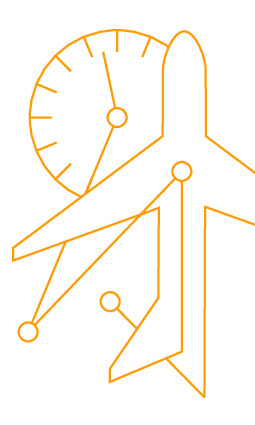|
|
|
| Module code: ABBG42 |
|
|
4V (4 hours per week) |
|
5 |
| Semester: 3 |
| Mandatory course: yes |
Language of instruction:
German |
Assessment:
Exam (minimum of 75% to pass) 60 minutes for General Aircraft Knowledge, 45 minutes for Principles of Flight
[updated 01.10.2020]
|
Exam recurrence:
The information regarding exam recurrence is found within the exam policy of the study programme (ASPO).
|
ABBG42 (P410-0003) Aviation Business (Basic), Bachelor, ASPO 01.10.2015
, semester 2, mandatory course
ABBG42 (P410-0003) Aviation Business (Basic), Bachelor, ASPO 01.10.2018
, semester 3, mandatory course
|
60 class hours (= 45 clock hours) over a 15-week period.
The total student study time is 150 hours (equivalent to 5 ECTS credits).
There are therefore 105 hours available for class preparation and follow-up work and exam preparation.
|
Recommended prerequisites (modules):
None.
|
Recommended as prerequisite for:
ABBG15 Airline Maintanance Management
ABBG411 ATPL Test Preparation
ABBG47 General Aircraft Knowledge II & Priciples of Flight II
ABBG62 Visual Flight Training II
[updated 05.11.2021]
|
Module coordinator:
Studienleitung |
Lecturer: Studienleitung
[updated 01.10.2018]
|
Learning outcomes:
General Aircraft Knowledge (broader term) Part 1:
General aircraft knowledge is subdivided into the subjects:
_ Airframe and systems, electrics, powerplant, emergency equipment
_ Instrumentation
After successfully completing this course, students will have comprehensive knowledge about airframe designs and materials used, loads applied to the aircraft structure, and aircraft construction including airplane systems and propulsion systems and the instrumentation. This knowledge will enable students to operate single-engine airplanes, to recognize coherences between technical systems and indication of parameters.
Principles of Flight Part 1:
This subject starts with elementary physics and theories of subsonic airflow. After successfully compeleting this part of the course, students will have acquired knowledge about different aircraft axis, wing design, air foil pressure distribution, aerodynamic forces and loads applicable to operate a single-engine, propeller-driven airplane in a low subsonic speed range. Students will have an understanding of speed, manoeuvre and load limitations and their underlying principles.
[updated 01.10.2020]
|
Module content:
General Aircraft Knowledge Part 1
1. Airframe and systems
1.1. Airframe design and materials
1.2. Aircraft construction
1.3. Loads applied to aircraft structures
1.4. Fuselage, wings, control and stabilizing surfaces
1.5. Landing gear, wheels, tires
1.6. Pneumatic systems
2. Electrics
2.1. DC electrics - basic principles -magnetism
2.2. Switches
2.3. Batteries
2.4. DC generation
2.5. Circuit protection and capacitors
2.6. Aircraft electrical power system
3. Powerplant
3.1. Essential physics revision _ internal combustion principles _ the properties of gases _ the gas laws _
mechanisms of heat transfer _ Newton_s laws of motion _ thrust _power _torque
3.2. Piston engines _ principle of operation _ designs and components
3.3. Engine starting and ignition
3.4. Piston engine lubrication and cooling
3.5. Piston engine fuel system
3.6. Piston engine supercharging
3.7. Piston engine power, efficiency and control
3.8. Propeller aerodynamics
3.9. Instrumentation
3.9.1. Pressure sensing
3.9.2. The altimeter
3.9.3. The vertical speed indicator
3.9.4. The air speed indicator
3.9.5. Air temperature measurement
3.9.6. Terrestrial magnetism
3.9.7. The direct indicating compass
3.9.8. Gyro basics
3.9.9. Gyroscopes
3.9.10. Directional gyro indicator
3.9.11. Attitude indicator
3.9.12. Turn indicator & turn coordinator
3.9.13. Aircraft magnetism & deviation
3.9.14. Engine instruments
Principles of Flight Part 1
1. Air, atmosphere, airspeed, airflow
2. Aerodynamic forces, aerofoil pressure distribution
3. Introduction to lift
4. Introduction to drag
5. Aircraft axis, aircraft wing, design of wings
6. Lift augmentation
7. Three dimensional airflow
8. Aircraft drag
9. Stalling, stall warning
10. Spinning
11. Level flight, climb, descent, turns
12. Propeller design and effects
[updated 01.10.2020]
|
Teaching methods/Media:
Lectures, exercises, calculations/ppt and keynote presentations, white board, flip chart, iTunes U, iPad or MacBook, animations,
[updated 01.10.2020]
|
Recommended or required reading:
- ATPL learning objectives, EASA 2016
- ATPL Aircraft General Knowledge Airframe & Systems, Slate Ltd. 2012
- ATPL Aircraft General Knowledge Electrics, Slate Ltd. 2012
- ATPL Aircraft General Knowledge Engines, Slate Ltd. 2012
- ATPL Aircraft General Knowledge Basic Instrumentation, Slate Ltd. 2012
- ATPL Principles of Flight, Slate Ltd. 2012
[updated 01.10.2020]
|


